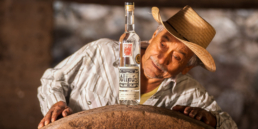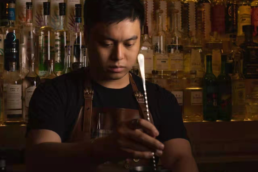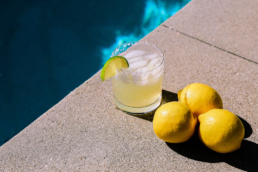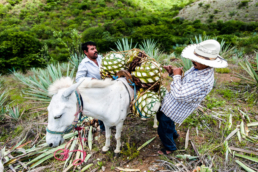ASIA PACIFIC, 21 OCTOBER – Mezcal is one of the world’s most artisanal products, with wide variations in style, and a story behind every bottle. The smokier sibling of the also agave-based tequila, mezcal has been captivating audiences around the world. Created by cooking agave inside earth pits over charcoal and wood before distilling in clay pots, the result is a distinctive smokiness and deep, earthy notes that discerning drinkers and bar folks have come to love.
After being de-marketed in for its supposed hallucinogenic elements, Mezcal was given a second chance in 1994 when local regulations and official certifications were made to govern its production. The spirit developed from being known as a Mexican liquor with a worm in the bottle in the 2000s, to a highly revered bona fide contender not just among agave spirits, but spirits at large. — this paragraph needs rewriting, it probably only needs to be a sentence, “as recently as the 2000s, mezcal was known as the Mexican spirit with the worm in it,” or along those lines.
But as the world discovered quality tequila, they also took a fresh look at mezcal. This newfound popularity means that mezcal producers are reaching more people than ever before.
“With the rise of the popularity of tequila, people are looking to explore the agave category,” explains Luke Sanderson, Advocacy Director of True Believers, “Locally, accessibility was difficult for many years, we just couldn’t get our hands on it but now we have one of the best agave bars in the world here in Australia, Cantina OK!”
“From distributors and suppliers to bars, everyone is importing and having more stocks of agave spirits. Every bar will stock at least one kind of agave spirit; some bars will stock more than two kinds of mezcal. All our local bartenders have been learning more knowledge of mezcal and tequila.
The whole beverage industry has been promoting agave spirits, not only in mainland China but also on a global scale. It would be a new trend in the cocktail scene for sure!”
Mezcal is also coming into its own as a cocktail ingredient, explains Sanderson. He further elaborates that Mezcal has a taste profile traditionally reserved for the whisky category and Islay with its bold smokiness. But today, it is a true exploration of these notes in our cocktails in a light and fresh way.
Leung affirms the depth that mezcal brings to cocktails. “Making a cocktail with mezcal gives the cocktail more layers, thanks to its bold smokiness of it. Every classic cocktail I have made with mezcal so far is all very well balanced on the palate and delicious.”
Not only does this extraordinary spirit create opportunities for bartenders to dabble in cocktails with the discovery of flavours, but it’s also a chance for customers to experience something a little different.
If you’re new to the spirit, there are a couple of guidelines to keep in mind.
Mezcal is like wine in that it is expressive place and terroir-driven. Agave is an agricultural product, like wine, with its own harvesting period — typically it takes seven to eight years for an agave to mature. The most commonly used agave species for mezcal is espadin, with tobalá, tobaziche, tepeztate, arroqueño and many more.
Some mezcals are more vegetal, some are floral, and some are sweet and have notes of honey. Others are nutty, or earthy, or taste strongly of minerals. Sanderson recommends trying everything and create a reference point that will assist in exploring the other regions flavours. While if you are looking for a rich, fruit-forward flavour, Robin would highly recommend tobalá mezcal.
But as mezcal grows in popularity, so does the demand on production, and — as Sanderson anticipates — there will be pressure to use automated production techniques using large-scale production and high-end equipment like fibre optic refractometer, fractionator, diffuser and more to meet demands.
This popularity is something Leung is cautious of. “For the sustainability and future of distilling mezcal, I’m hoping that practices and regulations are put in place to ensure the continuation of agave cultivation to prevent the overconsumption of agave.”
This is why it’s important to choose sustainable mezcal brands. These environmentally and socially conscious businesses help to ensure the resilience of mezcal, both as a spirit category and as a cultural story. It’s possible for mezcal to stay true to its roots, after all, mezcal’s small-batch independence and quality are exactly what consumers are looking for.





